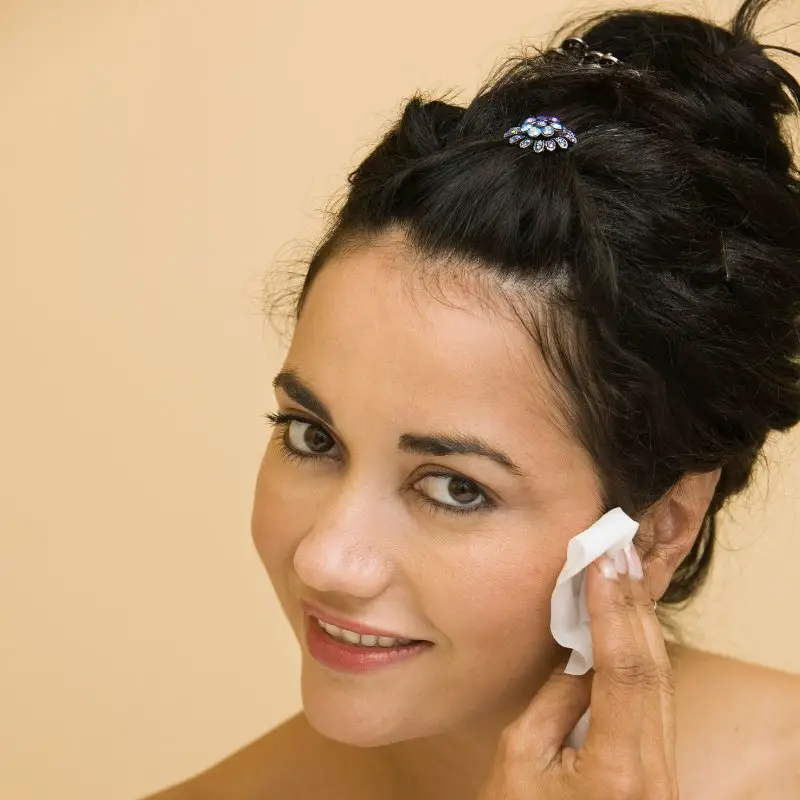Acne breakouts can happen to anyone at any time. Although you may notice more breakouts during adolescence, it’s not uncommon to have acne as an adult. Also, contrary to popular belief, acne is not an indicator of your hygiene habits or diet, not directly anyway. Keep reading to find out what is causing your acne problems and the truth behind some myths about the dreaded breakout.
You may be surprised at what you learn…
Table of Contents
- What Is Acne?
- What is causing my acne breakouts?
- Are There Different Types of Acne?
- What Is Cystic Acne?
- Can I Get Acne as an Adult?
- Does Eating Junk Food Trigger Acne?
- Can I Get Acne from Not Washing My Face Enough?
- Is My Makeup Causing My Acne?
- What Can I Do About My Acne?
- Final Thoughts
What Is Acne?
The simplest way to describe acne is a hair follicle that gets clogged with dead skin cells and oil. Teenagers tend to have more acne outbreaks, but it can happen at any age. Even people who were born with seemingly perfect skin are not immune to an occasional pimple.
What is causing my acne breakouts?
There may be a variety of factors that contribute to why a person has acne. They include:
- Clogged hair follicles
- Too much oil production
- Bacteria
- Hormones
Additional factors like diet, stress, hormone fluctuation, and certain medications may trigger an outbreak or make it worse.
Are There Different Types of Acne?
Acne may manifest in different types of eruptions.
- Whiteheads – small, whitish bump with a circular center
- Blackheads – black or dark-centered bumps that may be slightly raised
- Papules – bumps under the surface with no visible center, may be tender and inflamed
- Pustules – commonly known as pimples with a white or yellowish pus-filled center and a slightly raised, inflamed base
These minor forms are the most common and each type has different symptoms and appearance.
What Is Cystic Acne?
Cystic acne is one of the most serious forms of acne because the inflammation is deep under the skin. It’s characterized by large and painful soft lumps very deep under the surface. They may be red or white in color and are filled with pus. This type of acne can lead to skin complications like scarring.
Can I Get Acne as an Adult?
If you thought you had left acne behind in your teen years, you’d be wrong. You can get acne at any age and adult-onset acne is not uncommon. Even if you’ve never had an outbreak in your life, you can get your first one as an adult.
Some common reasons for an adult outbreak include:
- Hormone fluctuation
- Stress
- Hair and skin products
- Family history
- Side effect from medication
- Another undiagnosed medical condition
Does Eating Junk Food Trigger Acne?
As a teenager, you may hear that eating junk foods like pizza or fries can trigger an outbreak or make it worse. This myth is perpetuated all over the world. And it isn’t true. Eating junk food or greasy food, though bad for your overall health, doesn’t necessarily trigger an outbreak. Nor does it make it worse.
However, other types of foods like dairy and high glycemic foods may make acne worse, so you may have to watch your diet, but it isn’t the usual suspects you have to be wary of.

Can I Get Acne from Not Washing My Face Enough?
As mentioned, acne is not caused by dirty skin. Over-enthusiastic scrubbing and harsh cleansers may actually make acne worse. Why? Not only can it dry out the skin and cause excess oil production, but scrubbing too hard may irritate the skin’s surface, too.
Is My Makeup Causing My Acne?
Cosmetic products don’t necessarily cause acne, especially if you take the time to properly remove your makeup. Some cosmetics, however, may clog pores. So if you have acne-prone skin, you may want to search for oil-free makeup labeled “non-comedogenic.” That simply means that the product doesn’t clog pores.
What Can I Do About My Acne?
Generally, over-the-counter medications may help tame the occasional outbreak. Watch your diet and stress levels, too. If your acne is severe or doesn’t seem to be getting any better, you may also see a dermatologist for stronger prescription medication to combat outbreaks.
Check out these acne-related posts on our blog:
- Tea tree oil brands for acne
- Best moisturizer for acne prone skin
- Best non-comedogenic foundation for acne-prone skin
- Best enzyme masks for acne
- Sunscreens for acne-prone skin
- Best makeup for acne scars and large pores
Final Thoughts
Acne outbreaks can happen at any time and age. However, taking care of yourself and living a healthy lifestyle may help keep those outbreaks at bay.
In addition, try not to further aggravate any acne outbreaks. Cleanse the area gently and avoid scratching or picking at it. You may also want to try one of the many over-the-counter acne medications.
Lastly, if it’s severe or doesn’t seem to get any better with non-prescription medication, it may be time to schedule an appointment with your health care provider. Your doctor may recommend other treatments that can help speed the healing process along and minimize the chance of future outbreaks.
Do you have tips for handling acne?

